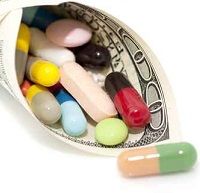Attack on Generics' Price Escalates
Two more US senators have signed on to sponsor a bill addressing the rising prices of some generic drugs. The measure would penalize manufacturers when prices rise faster than inflation. The office of the US Inspector General for Health and Human Services also announced last week that it will soon begin a study of those increases.

A US Senate bill that would penalize generic drug manufacturers for excessive price increases has gained additional sponsors.
Introduced by Sen. Bernie Sanders (D-VT) S1364 now has 6 co-sponsors, all Democrats. Two of them, Sen. Elizabeth Warren (D-MA) and Sen. Sheldon Whitehouse (D-RI) signed on last week.
The measure would force generic drug manufacturers to pay Medicaid a rebate whenever the size of a price increase outpaced the US rate of inflation.
Backers of the Sanders bill have estimated it would cost drug manufacturers about $1 billion a year, and save taxpayers the same.
That would help the government with Medicaid costs, but it would have no direct impact on consumers who do not get drug coverage through Medicaid.
Insurers will likely continue to foot that bill, passing cost increases along in the form of higher co-pays and premiums.
Sanders' website offers a list of generics with recent price hikes as high as 8,281%--the increase in the price of 500 tablets of doxycycline to $1,849 in 2014 from $20 in 2013.
The Generic Pharmaceutical Association has denied that price increases are a problem.
“This effort is misguided and will threaten patient access to affordable medicines,” Ralph Neas,chief executive of the trade organization, said. Instead, Neas suggested, “Congress should encourage the timely FDA review of the more than 3,000 generic drug applications that have been filed with the agency,” which would foster competition and drive prices down, he said.
On the regulatory front, the US inspector general for Health and Human Services has put a review of price increases in generic drugs on its updated work plan, the first action that office has taken since receiving a letter from Sanders April 13, 2015, requesting that the IG look into the price hikes.
In announcing the planned review in its mid-year report, the IG’s office wrote: “We will analyze generic drug prices over a period of time to determine whether prices increased more than the increases in inflation as measured by the consumer price index for urban consumers.”
It continued, “Under the Medicaid drug rebate program, manufacturers are required to pay an additional rebate when the average market price for a brand-name drug increases more than the consumer price index (urban) increases,” a penalty that manufacturers already pay in the case of brand-name drugs.
The IG review calls for quantifying “any potential savings from requiring an inflation-based additional rebate for generic drugs."
Attorneys general in Connecticut and Vermont are also looking at possible collusion among some manufacturers. There have been allegations of practices such as buying up several generic drug companies as a way to corner the market—and set pricing—for a specific drug.
At the June 6-10 American Medical Association’s House of Delegates meeting in Chicago, the delegates instructed the AMA to pursue efforts to find ways to address the increases.
Many physicians spoke of specific instances of generic drug prices go up multiple times their cost, sometimes abruptly but more often over the past few years. For instance, said Georgia delegate John Antalis, MD, the price of the antibiotic doxycycline now costs $276, up from $70 a few years ago. One physician said a patient called him from a pharmacy to report that the generic version of aripiprazole (Ablilify/Teva) cost more than the brand name of the drug.
At least 12 states require pharmacists to give patients to generic drugs when available and many more allow the substitution. If the plans permitted patients to get whichever version of a drug was cheaper, that could help fight some generic drug price increases. Health plan specifics are a matter of state regulation.
At the AMA meeting, Mario E. Motta, MD, cardiologist in Salem, MA, wondered why generic digoxin, the pharmaceutical version of digitalis (a common garden flower also known as foxglove), cost $180 when it costs about a penny a pill to manufacture and has been used for more than 200 years as an herbal tea.